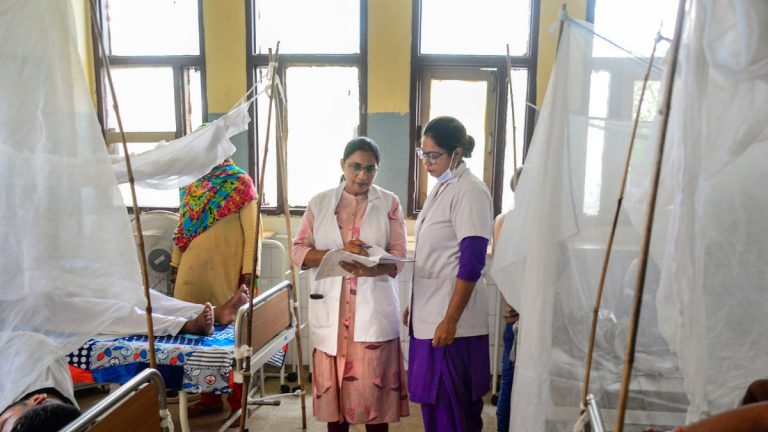Dengue cases have started to increase significantly in India, especially in the southern states. The extent of the surge in cases has varied by state and city, from seeing as many as 10 patients a day to 200 now.
While Delhi-NCR has noticed a slight surge, Mumbai and Kolkata have seen modest spikes, while southern cities and states have reported significant spikes.
Cases have increased since the start of the monsoon season, which typically exacerbates mosquito-borne diseases due to an increase in mosquito breeding sites.
Several doctors News18 spoke to said dengue symptoms remain the same as in previous years, but they have observed an increase in cases of serious complications, especially low blood pressure. In addition, many patients (20% to 50% of OPD cases) require hospitalization.
Main symptoms include high fever, severe headache, pain behind the eyes, joint and muscle pain, rash and minor bleeding. Experts explain that these symptoms usually appear 4 to 10 days after a mosquito bite and can last for 2 to 10 days.
Cases amplify in southern India
Dr K Somnath Gupta of Yashoda Hospital in Hyderabad told News18 that as of early July 2024, he was seeing 200 dengue cases every week. In Karnataka, about 20-30% of reported cases require hospitalization due to severe symptoms or complications.
Gupta believes that this year, the frequency and severity of the disease has increased due to increased transmission rates. “The current outbreak has seen an increase in severe cases and complications, possibly due to the co-circulation of multiple dengue serotypes.”
Karnataka reported more than 9,000 dengue cases and seven deaths from January to July this year, according to state government data. As of July 13, 66,298 people have been tested for dengue fever, of which a total of 9,082 people tested positive for fever.
However, Dr L Sudarshan Reddy, senior consultant physician at Yashoda Hospital, told News18 that the actual number is estimated to be “at least three times that”. “Reinfections tend to be more serious and often require hospitalization,” he said.
Similarly, Dr Sheela Chakravarthy, head of internal medicine at Fortis Hospital, Bannerghatta Road, Bengaluru, said she receives five to six dengue cases every day, of which two to three patients require admission, which means almost half of OPD patients require admission.
“Currently, we have 18 patients admitted, including one critical case. It is worth noting that the number of cases has increased in the past week,” she said.
Chakravarty stressed that patients must be checked for danger signs such as low blood pressure and advised people to stay in check while receiving treatment in a home setting.
Dr Tharanath S, an infectious diseases expert at Bengaluru's Yelahan Kasparsh Hospital, said the number of cases has increased “exponentially” in the past month.
“Between July 1 and July 19, our OPD has received nearly 100 cases with dengue fever-like clinical symptoms, 30% of which required hospitalization for further treatment due to severe symptoms.”
“While the symptoms of dengue are consistent with previous years, we have noticed an increase in cases of serious complications such as hypotension.”
Dengue fever status in Delhi-NCR, Kolkata and Mumbai
In July, doctors in the National Capital Region of Delhi began noticing a slight spike in as many as five patients a day being treated with OPD, some requiring hospitalization.
“In the past one week, our hospital has been admitting an average of 2-3 dengue patients every day. Since July 1, we have noticed a sharp increase in cases with around 10-12 severely affected patients suffering from severe symptoms such as low platelet count and severe dehydration. Symptoms requiring admission to Ramshila Specialty Hospital.
While Jain said the symptoms are consistent with ones that occur every year, doctors are watching for more complex cases. “Last week, we admitted five patients, two of whom required intravenous fluids and three who required oral fluids and medications.”
“Most of these patients came to us with high fevers of 103-104 degrees,” said Dr. Satish Koul, senior director and department head, Department of Internal Medicine, Fortis Memorial Institute, Gurgaon. Koul started seeing three patients a day. to four patients. “Fever takes four to five days to subside, and from the eighth day, patients can begin to recover.”
Narayana Hospital in Howrah, Kolkata, called the rise in dengue cases “alarming”. “The rise in dengue cases in Kolkata is alarming and highlights the urgent need for additional preventive measures. The situation is gradually worsening with a 20-25% increase in OPD and emergency dengue cases.
Doctors believe dengue fever is particularly dangerous for people with comorbidities such as diabetes, high blood pressure or asthma.
Dr Harshad Limaye, consultant internal medicine, Max Super Specialty Hospital, Nanavati, Mumbai, said: “While dengue can strike anyone, there is no specific group of people who are more susceptible to the infection, but people with comorbidities are prone to severe dengue complications.”
“Overall, we are seeing five to seven patients being admitted to the hospital every day and many more are being admitted in the OPD. Since last week, the surge in cases has started to attract attention.
However, Limaye advised people not to panic and rush to hospitals. “Dengue fever can be completely controlled at home with paracetamol and hydration. Stay in touch with your GP and follow the advice.
According to media reports, Mumbai has reported 513 dengue cases, followed by Nashik (348 cases) and Kolhapur (141 cases). Kolhapur accounts for 26% of these cases.
